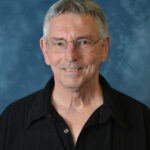The Music Department is excited to announce the second season of its virtual music series!
Hosted by Wesleyan’s Music graduate students, this series showcases the performance, compositional, and research capabilities of Wesleyan graduate music students, alumni, and other Wesleyan affiliates. We recognize the creativity of this diverse group and encourage collaborations as well as individual performances. Panels will be presented in 4 weekly installments on Wednesdays at 8 PM during April and May 2021.
Performances will be available for viewing starting from 8 PM on the scheduled dates and will remain available for the duration of the week. All videos will be re-posted to our YouTube channel for unlimited viewing at the end of our season.
Viewers may access our YouTube channel at this link:
https://www.youtube.com/channel/UCLB2eWWh3MBAH1KTHXxqeWg
Performance Schedule:
Wednesday, 4/21, 8 PM: Hector Gonzalez & Garrett Groesbeck, Omar Fraire
Wednesday, 4/28, 8 PM: Ridvan Aydinli, David P. Nelson
Wednesday, 5/5, 8 PM: Eliot Bates & Ars Troitski, Webb Crawford
Wednesday, 5/12, 8 PM: Stuart Wheeler
About the Performers
Ridvan Aydinli
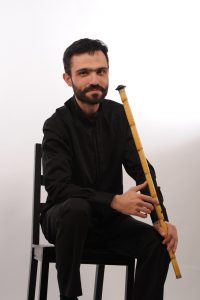
| A journey in makam
Abstract: Is makam more than just a scale? Rıdvan Aydınlı presents the key concept of the Ottoman/Turkish makam tradition, namely, seyir. This presentation will feature short excerpts from the classical instrumental and vocal repertoire as well as brief improvisations (taksim). Bio: Ridvan Aydinli is an MA student in Ethnomusicology, ney player, and singer. His musical and research interests include Ottoman/Turkish music, Byzantine music and notation, improvisation, transformation of musical traditions. He received his BA degree in economics at Boğaziçi University, and MA degree with the thesis “The usul concept in Karamanlidika sources of Ottoman/Turkish music” in the department of Turkish Religious Music at Marmara University, Istanbul, Turkey. Aydinli performed concerts and recorded albums with various ensembles in several countries. Their third album with Lâmekân Ensemble is going to be released in May ’21. |
Eliot Bates ’97 and Ars Troitski
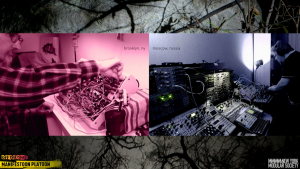
| the third zoo (2021) Abstract: manifestoon platoon (Eliot Bates [MA 1997] and Ars Troitski) came out of the convergence of two needs: 1) maintaining meaningful connections across great distances (Brooklyn–Moscow) during the COVID-19 pandemic, and 2) doing something productive within the space of electronic music. Through our work in producing and performing in events for the New York Modular Society, our recording work, and our anti-pastoralist available light photography, we have been exploring new ways of collaboration that involve, but aren’t limited to, modular synthesis. In this work, we’ll be sharing our most recent synchronous, networked audiovisual performance, following the current manifestoon found here: https://manifestoon.org/manifestoon/ |
Webb Crawford
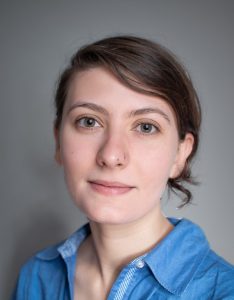
| Blob-ing
Abstract: Stylists and photographers for fashion magazines are sometimes called upon to arrange makeup into attractive blobs. Bio: I’m a guitarist, improviser, composer and luthier. I’ve built stringed instruments ranging from electric guitars, basses and mandolins, to modern reconstructions of historical instruments and instruments made from recycled materials or found objects. I have a background in jazz, and studied for three years with composer-performer Mary Halvorson. In 2017, I worked at the Massachusetts Museum of Contemporary Art to restore the instruments of Gunnar Schonbeck as part of a playable interactive exhibit, and work regularly with environmentalist instrument-building group Bash the Trash. |
Omar Fraire, ’17
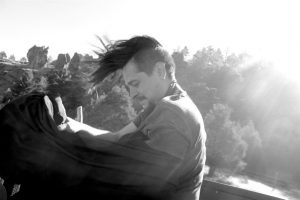
|
Transduction | quotation | articulations of power
Abstract: Encaminar mis investigaciones hacia toda clase de intentos infructuosos caracterizados por la indecisión
Human as an artist, inventor, magician, curator, teacher. After having deserted from two composition universities in México, he specializes in Sonology (Koninklijk Conservatorium – Holland) and holds a Master’s Degree in Contemporary Art as auditor (Aguascalientes). His work is inserted into reality by transducing it and functions as an act of resistance. Enjoys collaborative work and his energies oscillate across fields of knowledge. Creator of Punto Ciego Festival and artist of the Guggenheim Aguascalientes, is mostly self-taught although he holds an M.A. at Wesleyan and currently studies a Ph. D at UVA. Humano como artista, inventor, mago, curador, docente. Después de desertar de dos universidades de composición en México, se especializa en Sonología (Koninklijke Conservatorium – Holanda) y tiene una Maestría en Arte Contemporáneo como auditor (Aguascalientes). Su obra se inserta en la realidad transduciéndola y funciona como un acto de resistencia. Disfruta del trabajo colaborativo y sus energías oscilan entre varios campos del conocimiento. Creador del Festival Punto Ciego y artista del Guggenheim Aguascalientes, es mayormente autodidacta aunque tiene una maestría en Wesleyan y actualmente estudia un doctorado en UVA. |
Hector Gonzalez
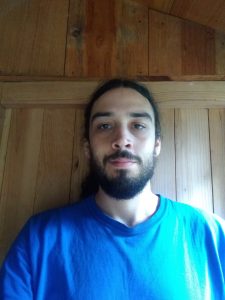
| Shoshin, for koto and EWI Abstract: “Shoshin” is a concept in Japanese Zen Buddhism that refers to a state of mind that encounters phenomena without expectations, translated usually as “beginners mind”. This piece was composed with such framework in mind, aspiring to reinterpret traditional sounds as part of a bigger sound palette that favors no preconceived notion of timbre. The Koto is “accompanied” by an EWI (Electronic Wind Controller), which serves the role of processing the audio gesturally and in real-time.Born on May 11 1990, in Guadalajara, Mexico. He studied an Associate’s degree in oboe (2010-2013) and a Bachelor’s in composition (2013-2018), both at “Universidad de Guadalajara.” His professional career has followed parallel roles as composer, performer and educator. His work is focused on mixed and electroacoustic music and reflects his interests in timbral exploration, cyclical elements, and the use of technological resources, specially gestural controllers and real-time audio processing. |
Garrett Groesbeck
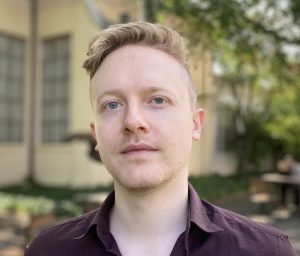
| Shoshin, for koto and EWI
Abstract: “Shoshin” is a concept in Japanese Zen Buddhism that refers to a state of mind that encounters phenomena without expectations, translated usually as “beginners mind”. This piece was composed with such framework in mind, aspiring to reinterpret traditional sounds as part of a bigger sound palette that favors no preconceived notion of timbre. The Koto is “accompanied” by an EWI (Electronic Wind Controller), which serves the role of processing the audio gesturally and in real-time. Bio: Garrett Groesbeck is an ethnomusicologist, koto player, and composer currently undertaking graduate studies at Wesleyan University. He received his MM in composition and theory from Nagoya College of Music as a Japanese Ministry of Education (MEXT) scholar, writing new music for Japanese instruments. From 2017 to 2019 he worked as an event coordinator for Japan Folk Festival, helping to arrange cultural exchange events in the Czech Republic, Vietnam, Canada, and Japan. Current research efforts focus on Eurocentrism in music education, particularly in Japanese institutions. His writing can be found in Japan Forum and Asian Music, and he has been profiled in Hōgaku Journal. |
David P. Nelson, ’91
| Karnatak Drumming: thinking beneath the surface
Abstract: David Nelson will demonstrate ways of using solkattu to de-mystify (or re-mystify) some Karnatak drumming compositions. Bio: David Nelson, mṛdaṅgam, began his studies with C. S. Sankarasivam in 1970. He learned briefly with Ramnad V. Raghavan, and for fourteen years with T. Ranganathan, first at CalArts (MFA 1975), then at Wesleyan University (Ph.D. 1991). He also studied kanjira with G. Harishankar, and jazz drumset with Ed Blackwell, Ed Soph, and Kenwood Dennard. He is Adjunct Associate Professor in Music at Wesleyan University, where he teaches South Indian drumming. He has accompanied leading Indian artists in the USA, Europe, India & China. His publications include extensive writings on South Indian drumming in the article “Karnatak Tala” published in The Garland Encyclopedia of World Music Vol. 5 South Asia: The Indian Subcontinent, in his two books: Solkattu Manual: An Introduction to the Rhythmic Language of South Indian Music and Konnakkol Manual, and his dissertation “Mridangam Mind: The Tani Avartanam in Karnatak Music.” His article “Three Generations, Three Directions,” appears in vol. 42 of The Journal of the Indian Musicological Society. In 2013 he was honored with the title “Kala Seva Mani” by the Cleveland Tyagaraja Festival, and in 2016 received the “Padmashree Palghat Raghu Memorial Award” from the Neelakanta Sivan Cultural Academy in Chennai. |
Stuart Wheeler
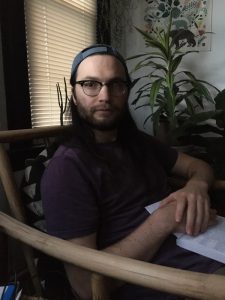
| Motet on Thoreau
Abstract: A set of variations on a biographical sketch of Henry David Thoreau (text by John Cage), performed for solo voice by the composer, accompanied by a film of over 400 drawings from Thoreau’s journals. Bio: Stuart Wheeler is a songwriter, composer, singer and instrumentalist. His interests include improvisation, intonation, translation, language and theater. From 2014 to 2016 Stuart was a co-curator of the bi-weekly concert series Avant GaRawge, in Provo, Utah. During that time he was also active with Deseret Experimental Opera (DEXO) – a DIY collective of musicians, poets, choreographers and visual artists dedicated to bootstrapping newly-created works within the malleable construct of opera. With DEXO, Stuart premiered The Heavenly City (2015), Red Lake (2016 – winner of the Alfred Lambourne Prize for sound) and the 55 brides of Brileen Young (2017), acting both as a composer and singer in all of those projects. He has created commissioned work for documentary film, screendance, plays, choir and Balinese gamelan. |

